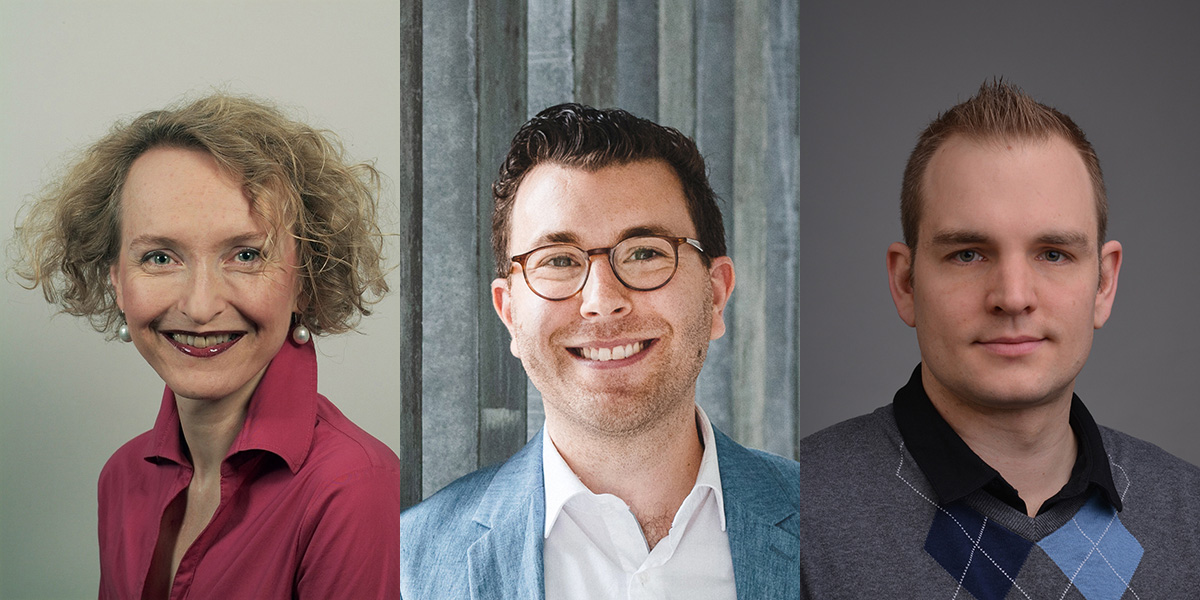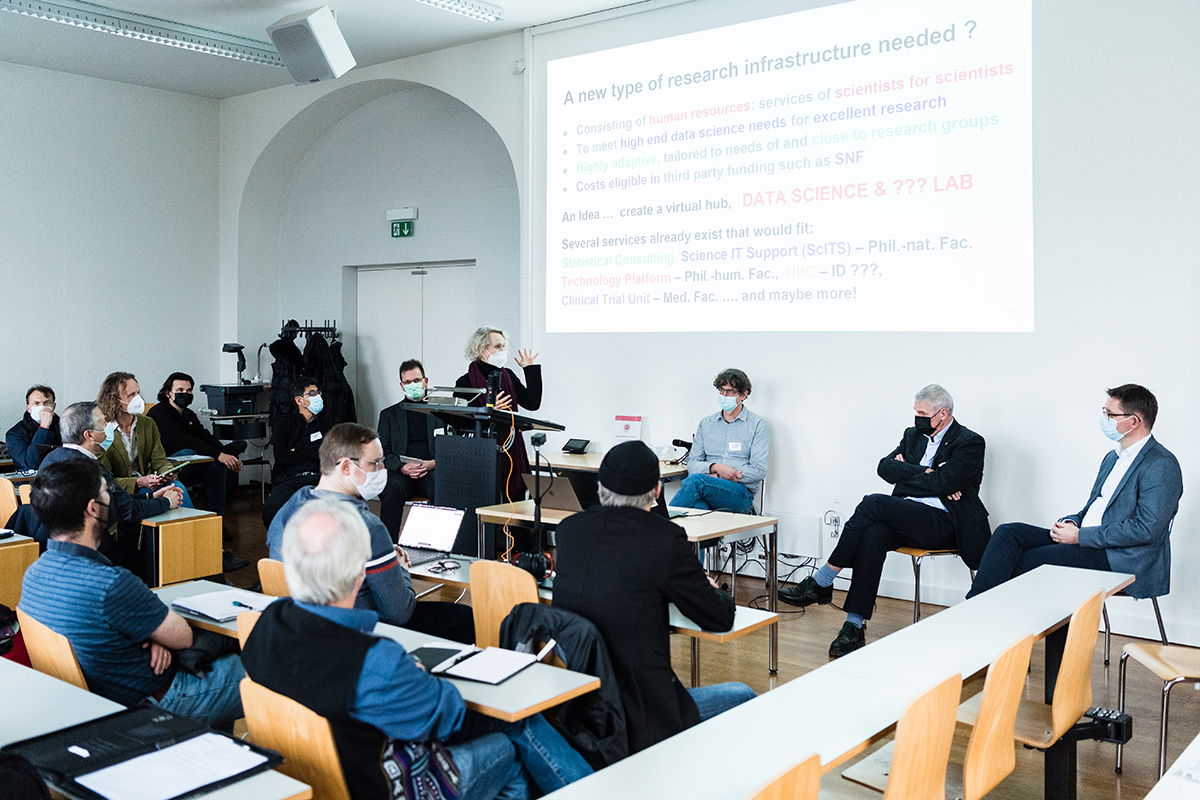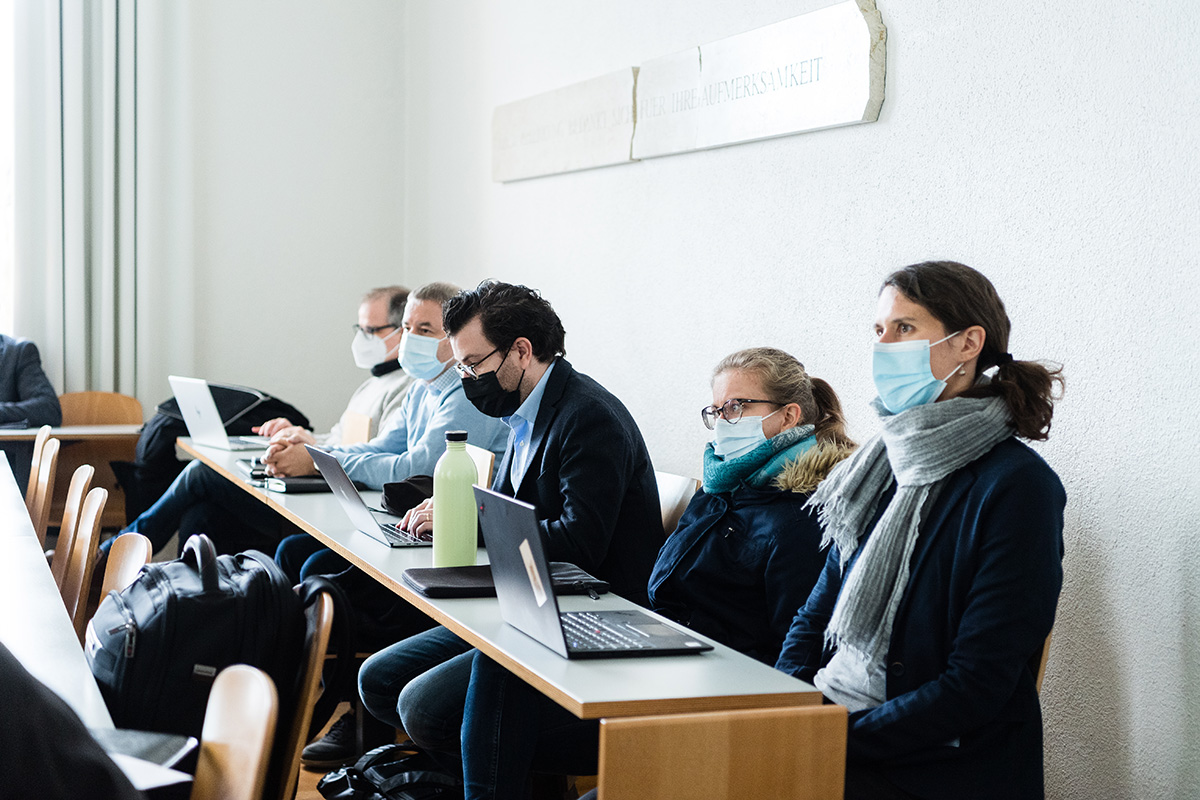A virtual hub promoting collaborative data science
The Bern Data Science Initiative, BeDSI, is a recently launched network at the University of Bern aiming to foster data driven research and promote it across disciplinary and faculty boundaries. In the interview, three initiators explain why this network is so important for the future.

Can you explain in a few words what BeDSI is all about?
Christiane Tretter: A historic look at the vision of our University “Knowledge creates value” shows three eras in which research creating knowledge has been evolving, from polymaths over highly specialized researchers to massively collaborative research projects, initially within one subject. The Bern Data Science Initiative, BeDSI, is designed to prepare our university for this new era. Our mission is to weave a flexible network lead by scientists into the university’s traditional structures to foster the work of data and simulation driven research groups and scientists across boundaries of disciplines and faculties. The huge success of the first Bern Data Science Day in April 2021, co-organized by the Science IT Support, ScITS, and the ARTORG Center for Biomedical Engineering Research, with about 160 young researchers participating in spite of ‚online only‘, was a great motivation to launch BeDSI this year.
Why is data driven research important and should it be promoted?
Tobias Hodel: Currently we see an immense up-tick in the generation of data, not only in the exact sciences and medicine but also in the humanities and social sciences. We are only at the cusp of realizing what the new possibilities offered by machine learning will allow us to research. At the same time, we need to think critically about the way we generate and interpret data. What are our explicit or implicit assumptions and therefore how are we epistemologically grounded?
Raphael Sznitman: I think it begins with our relatively new capacity to aggregate data across all stratas of society. Specifically in medicine, the ability to look at individuals and design so called patient-specific or precision medicine approaches based on data holds such great promise. Clinical data is nothing less than the analytical arm of precision medicine. That makes it extremely exciting, and this is exactly what we are setting out to make use of at the Center for Artificial Intelligence in Medicine CAIM, which goes hand in hand with BeDSI.
Already at the first Bern Data Science Day we were impressed by the great interest of our young researchers in opening up their work to others. The ARTORG Center looks forward to continuing this trend and has a lot to offer for the area of medical data science research.
How do data and simulation driven research groups benefit from networking within the university?
Raphael Sznitman: I believe that we can learn a lot from each other by sharing our research, looking into approaches, methodologies, and future research areas. Data science, like the large-scale efforts of the 1960s to put humans on the moon, is bringing many skilled people together: hardware designers, theoreticians, application focused, ethics etc. Keeping in mind these different perspectives is extremely enriching for personal growth, but beyond that helps to contextualize what we are doing every day. Of course, at the heart of this is the necessity for everyone to speak the same “language” and be able to communicate together. To do this, there is no better place to start than to network.

BeDSI will now build this network. What will the initiative offer and who will benefit from it?
Christiane Tretter: While BeDSI is research-driven and was launched by colleagues from several faculties, our activities have the potential to reach further. BeDSI will help to optimize the use of resources by fostering collaboration and synergies, e.g. by building common support structures for data intensive research or developing new multidisciplinary training and continuing education courses. Moreover, BeDSI will create a virtual hub promoting a cooperative work mode for complex interdisciplinary research tasks. We will also establish a scientific and scholarly forum for the discussion of the impact, both positive and negative, of the rapid growth of possible applications of data and simulation driven research for society.
Tobias Hodel :BeDSI has been organized bottom-up by basically bringing together scientists and scholars from all over the University of Bern. It’s mainly the interest in similar methods and questions. Since BeDSI is active in different directions and aiming at a wide variety of target groups, we think that it’s going to be interesting to students as well as researchers and even some central units of the University of Bern: Researchers from all faculties will profit from a network and professional support, students will have access to new kinds of interdisciplinary courses, and also teaching oriented units could benefit from data-driven analysis, such as learning analytics. Moreover, we expect that BeDSI will generate immediate added-value for the entire university by enhancing visibility for data and simulation driven research, e.g. on our website.
What are the next steps?
Christiane Tretter: BeDSI’s organization is guided by four principles, first to build a collaborative rather than hierarchical structure, secondly to increase connectivity and not compete with other university entities, thirdly to embrace both large research units as well as pioneering individuals as members, and to promote all aspects of data science and not just technical ones. Our first steps already reflect these principles. We formed several task forces to ensure that all members contribute their expertise on topics like high performance computing (HPC) and storage, activities and outreach, education, and services of ‚scientists for scientists‘. Our next step is to reach out to all faculties to attract interested colleagues from across the university, e.g. with BeDSI’s interdisciplinary lecture series.

At the BeDSI Launch Event last week, there were talks by BeDSI members from a wide range of research fields, a panel discussion, and much more. What was your personal highlight?
Tobias Hodel: Personally, it was less the inputs but more so to see how we all deal with similar challenges and methodological problems. This opens up an immense potential for cooperation and the exchange of expertise with regards to analysis but also to practical questions like storage, workflows and so on. In a sense, the breaks and the time to talk to colleagues were the “silent” highlights.
Raphael Sznitman: For me, I always appreciate learning about new things, and so a highlight was to gain insight into my colleagues and some of their work. Beyond this, the overall will by all participants to join in this network was very exciting and forward looking, especially the strong support from key figures at the University.
Christiane Tretter: I support everything Tobias and Raphael said. For me the enthusiasm of all colleagues involved as well as the presence of the rector, two vice-rectors, four deans, the new Head of the IT Services Office and the Digital Officer, in spite of their overfull agendas, has been extremely encouraging!
ABOUT THE BERN DATA SCIENCE INITIATIVE, BeDSI
The Bern Data Science Initiative, BeDSI, is an initiative of data driven research groups and research centres of the University of Bern. It is designed to weave a flexible network lead by scientists into the university’s traditional structures to foster the work of data and simulation driven research groups.
The BeDSI Launch Event took place on December 6, 2021. The event was featuring talks by BeDSI members from various horizons, thereby giving a representative overview of data and simulation intensive research conducted at the university of Bern. Podcasts of these talks are publicly available:
ABOUT CHRISTIANE TRETTER
Prof. Dr. Christiane Tretter is Full Professor for Mathematics and Co-Director of the Mathematical Institute at the University of Bern since 2006. Her research focuses on Applied Analysis and Mathematical Physics. She is Editor-in-Chief of the international journal «Integral Equations and Operator Theory, IEOT» and ‘Editorial Advisor’ of the London Mathematical Society, LMS. At the University of Bern, she has been co-organizing the Einstein Lectures from their start in 2008 and she was elected to the Managing Board of the Albert-Einstein-Gesellschaft. Having established the Science IT Support, ScITS, with strategic funds of the Faculty of Science in the last five years, she is the Founding and Ad-interim Chair of the Bern Data Science Initiative, BeDSI.
ABOUT RAPHAEL SZNITMAN
Prof. Dr. Raphael Sznitman graduated in cognitive systems from the University of British Columbia (Canada) in 2007. He received his PhD in computer science from Johns Hopkins University (USA) in 2011. He was then a postdoctoral fellow at the École Polytechnique Fédérale de Lausanne where he worked in the computer vision laboratory. In 2015, he joined the faculty of the ARTORG Center at the University of Bern. He is a full professor in AI for Medical Imaging and the director of the ARTORG Center for Biomedical Engineering and the Center of Artificial Intelligence in Medicine CAIM. His research interests are primarily in computational vision, probabilistic methods and statistical learning, applied to applications in medical imaging. He is Ad-interim Co-Chair of the Bern Data Science Initiative, BeDSI.
About TOBIAS HODEL
Prof. Dr. Tobias Hodel is Assistant Professor for Digital Humanities at the Walter Benjamin Kolleg of the Faculty of Humanities since 2019. His research focuses on machine learning applications in the humanities, digital text analysis, and digital humanities theory. He is co-editor of the series Digital Humanities Research (Transcript, Bielefeld).
About the author
Ivo Schmucki is an editor and the "Nature and Matter" representative at the University of Bern’s Communication & Marketing Office.